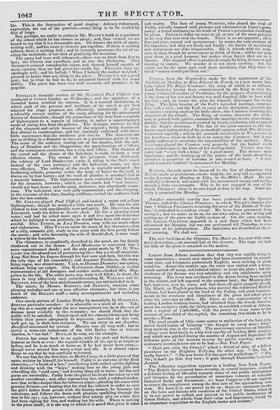Letters from Athens mention that that city was rapidly rising
to some importance ; several new streets had been constructed on a hand- some plan, and foreigners, particularly English, were arriving in great numbers. About two months ago the town was visited with a fever, which carried off many, and induced others to leave the place ; but the virulence of the disease was fast subsiding and the inhabitants again returning. The fever was attributed to the drains having been opened in the winter, and left exposed to the summer heat ; the Municipality had, however, seen its error, and had them all again properly closed. Mr. Black, an English gentleman, who married the celebrated Maid of Athens, bad been placed at the head of the Police, and great improve- ments in the comforts and cleanliness of the place had taken place since his accession to office. Mr. Glass as the representative of a leading London banking-house, bad obtained from the Greek Govern- ment the exclusive right, for thirty years, to establish a bank at Athens, with a capital of 1,500,000/., with the power to issue notes to the amount of one-third of the capital, the remaining two-thirds to be in specie.— Times. The good people of Ohio come nearer to realization of the long-pro- mised desideratum of bringing "the Gospel to every man's door," than anybody else in the world. The anniversary exercises, of Oberlin College were held lately in a big tent capable of holding WOO people; and which was pitched during the months of August and September in different parts of the western reserve for public worship, where no stationary mectinghouses are to be had. —New York Paper. " Have you seen the Comet ?" asked a friend of ours, of a fellow passenger on the Brighton Tally-ho, the other day. " No, Sir, I really haven't." "Do you know if it has past its perihelium ?" " No, Sir ; it don't go that way now; it goes through Dunstable."— Court Journal. The following suggestion appears in a leading New York Paper. "The 'British Government have recently, in several instances, evinced a delicate feeling of liberality towards many of our public institutions and libraries, by the presentation of numerous volumes of valuable historical books and documents : we hope Congress will not neglect to return the compliment among the first acts of the approaching ses- sion. We have it in our power to do so: there are numerous works on the laws and history and condition of the United States, which it is in our power to collect and present to the public institutions of Great Britain, and which, from their value and importance, would be an important acquisition to the English reader and student."


























 Previous page
Previous page